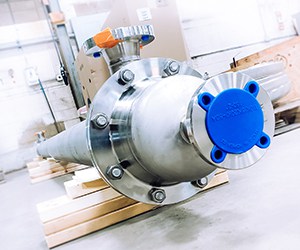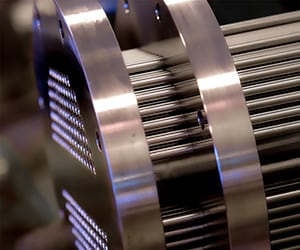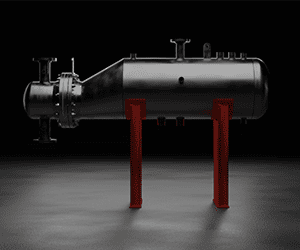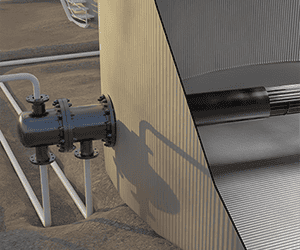Enerquip Thermal Solutions offers a broad range of shell and tube heat exchangers to handle various applications in industries from food and beverage to pharmaceutical. Learn more about the various stock and custom products we carry, as well as their features, applications, and benefits.
Heat Exchangers for Every Industry
Shell and Tube Heat Exchangers Explained
Shell and tube heat exchangers come in various types and styles, but generally speaking, they are constructed with an interior tube bundle and an outer cylindrical vessel, or the shell. This equipment achieves highly efficient heat transfer through fluid or gas flow. One fluid or gas flows within the tubing (tube side), while the other fluid or gas flows around the tube bundle (shell side). Heat exchange occurs through the tube walls, heating or cooling process fluids or gas as needed. Shell-side fluids, like a cooling water stream, will effectively change the temperature of the process fluids in the tubes, as they flow through the shell.
Enerquip’s stock sanitary shell and tube heat exchangers offer the following features and benefits:
- 100% stainless steel construction, grades 304L and 316L
- Multiple size options: 4 x 36 inches up to 10 x 54 inches
- Removable tube bundles and O-rings for easy cleaning and maintenance
- Sanitary tri-clamp connections
- U-tube heat exchanger designs, to allow for tube expansion and contraction
- Enhanced sanitation capabilities and corrosion resistance
- Ability to heat/cool low-fouling fluids
- ASME hydro-tested performance (includes code stamp)
- Compliance with TEMA Class C guidelines
- Compliance with 3-A Sanitary Standard, specific models
We can also build custom sanitary shell and tube heat exchangers to meet your unique requirements or application needs.
Sanitary Shell and Tube Heat Exchangers
Heat exchangers for sanitary industries like food, dairy, cannabis, and pharmaceutical sectors, to name a few, require not only high-quality components but also highly sanitary ones for their operations. Equipment for these industries must meet strict hygiene and sanitation standards for safety purposes. While they share a similar design to standard varieties, sanitary shell and tube heat exchangers do have unique requirements, such as sanitary tri-clamp fittings, seal-welded or rolled joints, polished material surfaces, and related design details.
Enerquip’s sanitary shell and tube heat exchangers can be customized with the following features:
- Material selection of 304L & 316L stainless steel, Duplex stainless steel 2205 & 2507, Hastelloy, Alloy 20, Monel 600, AL-6XN, and more
- Sizes up to 48” in diameter, depending on weight
- Removable tube bundles and O-rings for easy cleaning and maintenance
- U-tube or straight tube designs
- Expansion joints or floating tube sheets to aid in thermal expansion protection
- Enhanced sanitation capabilities and corrosion resistance
- Ability to heat/cool low-fouling fluids
- ASME hydro-tested performance (includes code stamp)
- Compliance with TEMA Class C guidelines
- Double tube sheet design
- Insulation jackets, free of chloride and asbestos
- Annular distributors
- Mounting supports or saddles
- Sight glasses, vacuum breakers
- Choice of sanitary tri-clamp, ASME flanged, or NPT threaded connections
- Compliance with the 3-A Sanitary Standard
- Passivation and electropolished product contact surfaces
- Davit arms (commonly used with heavy bonnet designs)
- And more
Industrial Shell and Tube Heat Exchangers
These exchangers’ design varies based on the individual requirements of a given application. For example, depending upon fluid compatibility in a system, an industrial heat exchanger may consist of carbon or stainless steel. Enerquip also utilizes Hastelloy, Monel, and other such metals for efficient heat transfer.
We offer an extensive industrial line of heat exchangers to achieve heating and cooling in liquid-to-vapor, vapor-to-liquid, vapor-to-vapor, hot oil-to-steam, hot oil-to-asphalt, and steam-to-asphalt applications, among others. Standard uses for industrial heat exchangers include regulating temperatures through HVAC systems, heating asphalt for optimal pliability, carrying out multi-stage evaporation in ethanol operations, gas cooling in landfills, and condensing organics in chemical manufacturing.
Enerquip’s industrial shell and tube heat exchangers can be customized with the following features:
- Material selection of Carbon steel, 304L & 316L stainless steel, Duplex stainless steel 2205 & 2507, Hastelloy, Alloy 20, Monel 600, AL-6XN
- Sizes up to 48” in diameter, depending on weight
- Removable tube bundles and O-rings for easy cleaning and maintenance
- U-tube or straight tube designs
- Expansion joints or floating tube sheets to aid in thermal expansion protection
- Ability to heat/cool low-fouling fluids
- ASME hydro-tested performance (includes code stamp)
- Compliance with TEMA Class C, B, or R guidelines
- Insulation jackets, free of chloride and asbestos
- Annular distributors
- Mounting supports or saddles
- Sight glasses, vacuum breakers
- Choice of ASME flanged, NPT threaded, or tri-clamp connections
- Passivation and electropolished product contact surfaces
- Davit arms (commonly used with heavy bonnet designs)
- And more
Pharmaceutical Shell and Tube Heat Exchangers
Pharmaceutical shell and tube heat exchangers must adhere to the hygienic requirements of this industry specifically. To ensure compliance, our engineers specialize in hygienic heat exchanger design and fabrication with tight tolerances. We also carry out rigorous inspections for optimal quality control.
Pharmaceutical heat exchangers typically include the following features:
- Sanitary tri-clamp fittings
- Roller-expanded tubes to create double-grooved tube sheets seal-welded in place
- A pitched design for gravity draining and cleaning on each side of the exchanger
- Polished, fully radiused return pockets and weep slots in pass partitions to facilitate cleaning and proper fluid drainage
- Pipe jackets polished to achieve a 40Ra finish
- Tubes polished to achieve a 25Ra finish, or even 15Ra electropolish finish
- Double tube sheets
Suction Heaters
Maintaining the proper thermal conditions within a storage tank for pumping fuel oil, asphalt, and other viscous fluids is quite costly for industrial plants. Suction heaters serve as a cost-efficient solution, only heating liquid as it’s pumped rather than the whole tank. These industrial heat exchangers work optimally with substances that, at lower temperatures, are semi- or fully solid. By reducing the viscosity of a tank’s contents using transfer fluid from a thermal oil boiler, the material’s fluidity increases and facilitates pumping.
Enerquip offers a range of standard and custom suction heaters with features including:
- Stainless or carbon steel construction, with other corrosion-resistant metals available upon request
- ANSI mounting flanges for bolting to the manway flange
- Options for NPT threaded, lapjoint, and sanitary tri-clamp connections
- Compliance with ASME code, or international codes upon request
- Ability to apply client-supplied nozzle loadings
- Design capabilities for seismic or other site considerations
- Decades-long lifespan
Bayonet Heaters
This heat exchanger variety’s design is optimized for efficiency as well as space savings. Rather than pumping fluids through a heat exchanger to warm them, bayonet heaters heat a full tank’s worth of fluid utilizing an immersed tube bundle within it. Through the tank’s flange, the bundle enters the fluid, which then experiences direct exposure to the unit’s heating coil for highly efficient heat transfer.
Applicable in oil and gas production, chemical processing, power generation, water treatment, and more, Enerquip’s standard and custom bayonet heaters offer:
- Heating for virtually all liquid varieties
- Stainless or carbon steel construction, or higher alloys for optimal corrosion resistance
- Standard bare tubes or welded on helically wound fins for greater surface area and heat transfer
- Resistance to high pressures and temperatures
- Long-lasting operation, even under heavy use or harsh environments
Steam Generators
Thermal fluid steam generators are ideal for applications that require steam, eliminating the need for large-scale boiler operation while boosting efficiency and cost savings. Not only do steam generators allow for more precise temperature control than boilers, but they also offer improved efficiency, safer operations, reduced maintenance needs, and rapid start-ups and shutdowns.
Enerquip makes high-quality steam generators featuring:
- Closed-loop systems for heating and circulating thermal fluid
- Highly efficient HPR (high pressure return) systems that prevent thermal energy loss
- Compact design for simplified installation
- Ability to keep condensate above its boiling point
- Capability to use diesel, natural gas, waste heat recovery, biomass, and other heat sources
Pairing an Enerquip industrial steam generator with one of our hot oil heaters will lend your system unparalleled energy efficiency and versatility.
Tube Bundles
Tube bundles are vital to shell and tube heat exchanger functionality as they provide the means for heat transfer. They’re also removable to allow for cleaning, maintenance, and replacement. Enerquip’s tube bundles come standard in 304L or 316L stainless steel, but customers may also upgrade to a variety of higher alloys. Design factors like shape, size, and tube arrangement also affect performance, impacting the heat exchanger’s efficiency.
At Enerquip, our selection of ASME hydro-tested, TEMA C-compliant stock U-tube bundles feature:
- Stainless steel construction, grades 304L or 316L
- Sizing of 6 x 54 inches or 8 x 54 inches
- O-ring or PTFE gasket types
- Surface finishes polished to a minimum of 32Ra
We also offer various upgrades and custom replacements to tailor our tube bundles to your needs and budget.
Off-the-Shelf Sanitary Heat Exchangers
Enerquip stocks a wide selection of pre-designed and -manufactured off-the-shelf heat exchangers that are readily available for purchase with quick delivery. Available in multiple sizes in stainless steel construction, our stock U-tube heat exchangers have a two-pass configuration and comply with ASME code and TEMA C guidelines.
Safety Code Compliance
You can be assured that Enerquip has your safety and the security of your facility in mind. All of our shell and tube heat exchangers are designed to TEMA C, B or R, following best practices for thermal design and construction.
We also evaluate every design using Compress codeware to ensure that your new exchanger will meet all of the safety requirements of ASME Code, along with any nozzle loadings, seismic considerations and other site conditions that can affect the stability of your equipment. Every exchanger design is reviewed and approved by a 3rd party inspector, who also provides oversight during fabrication, and witnesses the ASME hydro-test of every exchanger. We can also design and build exchangers to API-660 and other international codes where appropriate.
Learn more about the heat exchanger options available and find out which style is the ideal solution for your facility.
Reverse Engineered Drop-in Replacement
When a heat exchanger in your operation goes down, Enerquip understands the importance of getting your plant up and running again as quickly and efficiently as possible. We realize that there are cases where a new exchanger must fit in the exact spot of your old unit. We help take the worry out of this process, by assisting you in reverse-engineering a drop-in replacement exchanger.
We can work off of old drawings, U-1 data reports, TEMA data sheets and even photos and sketches to design an exchanger with sufficient surface area to replace your old exchanger.
If you have suspicions about what caused your old exchanger to fail, we can design safety features and upgrades into your new exchanger to lengthen its lifespan.
Many customers take this opportunity to upgrade materials to more corrosion resistant alloys like higher grades of stainless steel. They may also add an expansion joint to protect the new exchanger from thermal expansion damage from shock or sudden start-up conditions.
To simplify the installation of your new exchanger, and ensure that it will fit correctly, you will need to provide some dimensions such as nozzle tie points, and support locations. Some customers prefer to use lapjoint flanges on their exchanger to assist with lining up the bolts between their exchanger flanges and interconnecting piping.
Shell and Tube Heat Exchangers From Enerquip
Since 1985, Enerquip has specialized in American-made industrial and sanitary heating and cooling solutions for a broad range of industries. Contact us or request a quote today to learn more about our top-quality shell and tube heat exchangers and how our thermal solutions can help meet the demands of your specific application.








